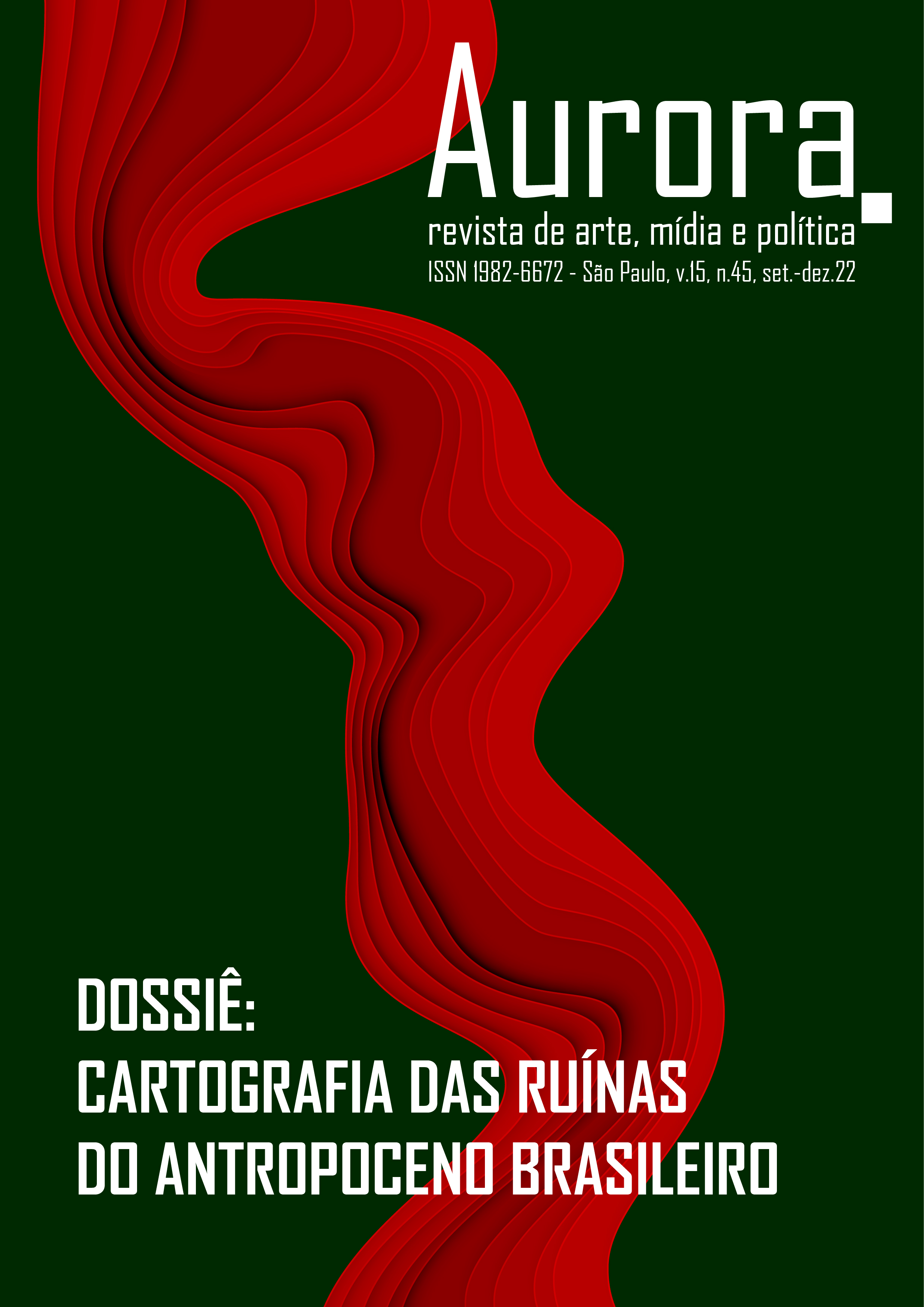Paths towards transversality in the Anthropocene
DOI:
https://doi.org/10.23925/1982-6672.2022v15i45p135-169Keywords:
Anthropocene, modern science, art and politics, transdisciplinarityAbstract
This essay is presented as a hope awakened in the reflections from the course Anthropocene - Transdisciplinary Approaches (IEB / USP) in the sense of thinking “new beginnings and not be wallowing in the mud of the end” about the new geological era called Anthropocene on planet Earth in the 21st century. The Anthropocene is thought of as a political problem of global magnitude regarding the experiences of extinctions of species, beings, plants and animals and the theoretical debate about the fate of the planet, especially from the warming of the climate. Among lyrics of song poems, the inaudible sound and fury reverberate in the silence of the paradox in the catastrophic noise of everyday survival. We will need everyone to think, act and change the organizational cosmologies that resulted in the tragedies that we face now and that are created by ourselves. Love must grow between all human beings and non-humans, or we will wallow in the barbarism of the unsustainability of the planet.
References
AGENDA 2030 da ONU (Organizações das Nações Unidas). Objetivos de Desenvolvimento Sustentável globais.
https://www.nacoesunidas.org/pos2015/agenda2030/ consultado em 07 de Abril de 2020.
ARENDT, Hannah. A Condição Humana. Tradução de Roberto Raposo. 5.ed. Rio de Janeiro (RJ): Forense Universitária, 1991.
ARENDT, Hannah. A Promessa da Política. Tradução de Pedro Jorgensen Jr. - 2.ed. Rio de Janeiro (RJ): DIFEL, 2008.
ARENDT, Hannah. A Vida do Espírito: o pensar, o querer, o julgar. Tradução de Antônio Abranches e outros. 2.ed. Rio de Janeiro (RJ): Relume Dumará, 1993.
ARENDT, Hannah. Entre o Passado e o Futuro. Tradução de Mauro W. B. de Almeida. 2.ed. São Paulo (SP.): Perspectiva, 1972.
BERKOWITZ, Roger. O chamado da natureza. http://www.bard.org. Tradução nossa. Consultado em 12 de Agosto de 2020.
BOFF, Leonardo. As origens do coronavírus - Brasil 247.
www.brasil247.com › blog › as-origens-do-coronavirus. Consultado em 15 de mar. de 2020.
CHAKRABARTY, Dipesh. O clima da história: quatro teses. Publicado originalmente em Critical Inquiry (2009). Tradução: Denise Bottmann, Fernanda Ligocky, Diego Ambrosini, Pedro Novaes, Cristiano Rodrigues, Lucas Santos, Regina Félix e Leandro Durazzo | Coordenação e Revisão: Idelber Avelar. Citando: Paul J. Crutzen e Eugene F. Stoermer, “The Anthropocene”, IGBP [International Geosphere-Biosphere Programme] Newsletter “ (2000): 2009, 11-12.
DARWIN, Charles. A origem das espécies por meio de seleção natural. Tradução de Pedro Paulo Pimenta, São Paulo (SP): Ubu Editora, [1859] 2018.
GAYE, Marvin (1939-1984). Mercy Mercy Me (the Ecology), Tamia-Motown. Columbia: USA. 1971.
GOLDSON, Howard. Um Elemento Necessário na Solução de Nossos Problemas Existencias. HAC Bard College. PO Box 5000. Annandale-on-Hudson, NY 12504
http://www.arendt@bard.edu. Consultado em 18 de Março de 2020.
GUEDES/BASTOS. Canção do Novo Mundo (Beto Guedes/Ronaldo Bastos), 1981.
GUEDES, Beto. Sol de Primavera.1979.
GUEDES, Beto. O Sal da Terra. Álbum: Contos da Lua Vaga, 1981.
ICMO, 2006. Reconciling Nature and human interests. Report of the International Committee on the Management of large herbivores in the Oostvaardersplassen (ICMO). The Hague/Wageningen, Netherlands. Wageningen UR - WING rapport 018. June 2006. ISBN 9032703528. 2006.
IMILAN OJEDA, Walter (2015) “Prevención, reacción y emergencia”. Material del curso "Vulnerabilidades ante desastres socionaturales", impartido en UAbierta, Universidad de Chile. LECCIÓN 3.1 Prevención, reacción y emergência, 2020.
JOBIM, Tom. Álbum “Passarim” de 1987. Música: Borzeguim Autor: Antônio Carlos Jobim. (1927-1994). 1987.
KRENAK, Ailton. Ideias para adiar o fim do mundo. 1ª edição. São Paulo (SP): Cia das Letras, 2009.
KRENAK, Ailton. A Vida não é Útil. 1ª edição. São Paulo (SP): Cia das Letras, 2020.
LARSEN, Clark et al. "Bioarchaeology of Neolithic Çatalhöyük reveals fundamental
transitions in health, mobility, and lifestyle in early farmers". Proceedings of the
National Academy of Sciences 116 (26) 12615-12623; 2019.
MBEMBE, Achille. Necropolítica. Biopoder, soberania, estado de exceção, política da morte. Tradução de Renata Santini. 3º edição. N-1edições, 2018.
PARDINI, P. (2020). Amazônia indígena: a floresta como sujeito. Boletim do Museu Paraense Emílio Goeldi. Ciências Humanas, 15(1), e20190009. doi: 10.1590/2178-2547-BGOELDI-2019-0009. 2020.
RAPIMAN, Eduardo. O encierro de los pillanes. Chile, 1975.
Downloads
Published
How to Cite
Issue
Section
License
Copyright (c) 2023 Aurora. Revista de Arte, Mídia e Política

This work is licensed under a Creative Commons Attribution-NonCommercial-ShareAlike 4.0 International License.










